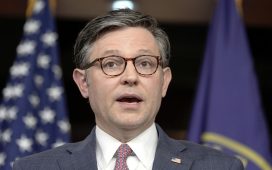Editor’s Note: Weekly Transportation is a weekly version of POLITICO Pro’s daily Transportation policy newsletter, Morning Transportation. POLITICO Pro is a policy intelligence platform that combines the news you need with tools you can use to take action on the day’s biggest stories. Act on the news with POLITICO Pro.
WAIT, WAS THAT INFRASTRUCTURE WEEK? There was a moment last week when it seemed like everyone was talking about infrastructure. One could even call it … “Infrastructure Week.”
— The Senate Environment and Public Works Committee started work on a surface transportation reauthorization, which will likely be a significant rewrite of the one the committee approved in the last congress.
— Majority Leader Chuck Schumer said he planned to turn to President Joe Biden’s Build Back Better plan as soon as the Covid relief bill is dispensed with. (The House passed that bill early Saturday — more on that later.)
— Senate Budget Committee Chair Bernie Sanders said he would even move an infrastructure plan through reconciliation, allowing Democrats to make fewer compromises with Republicans.
— Then Senate Appropriations Committee Democrats said they’d rather go the traditional route with a bipartisan bill.
The drumbeat was enough to make you think movement was imminent.
A few small reality checks:
— The Build Back Better plan involves more than just infrastructure. It also involves manufacturing and supply chains, caregiving and education. When senators talk about tackling this plan, it’s unclear how much of that would go to infrastructure.
— There’s a surface transportation bill due in seven months. In the next few week, the House will likely introduce a lightly revamped version of the $1.5 trillion infrastructurepalooza bill it passed in the last Congress. Senate leaders plan to report their bill to the floor by Memorial Day, not the March timeline leaders are contemplating for starting work on Build Back Better.
— There are countless ways this could all shake out. But it’s well worth considering that the existence of a deadline later in the year for a surface bill could offer lawmakers a convenient justification for leaving major infrastructure investment for later.
— Do we even need to say it? People, there is no way to pay for any of this.
IT’S MONDAY: You’re reading Morning Transportation, your guide to what Washington’s doing on planes, trains, cars and everything that moves. We’re diving into covering the Biden administration, and MT would love to hear your tips, pitches and feedback about the next four years. Get in touch at [email protected] or @samjmintz.
Rock out to our transportation playlist on Spotify.
SENT UP: The House approved a $1.9 trillion Covid pandemic rescue plan early Saturday, with all but two Democrats supporting the package and no Republicans backing it, POLITICO’s Caitlin Emma and Sarah Ferris reported. The bill’s passage was applauded by unions and transportation industry groups that have been seeking the billions of dollars in additional relief funding included in the bill and are pressing the Senate to quickly take up the measure.
In case you forgot, here are some of the numbers: The House package includes $30 billion for transit, $8 billion for airports (including $800 million for airport concessionaires), $3 billion for aerospace manufacturing and $1.5 billion for Amtrak.
SOMETHING TO TALK ABOUT: The airline industry says it is getting serious about sustainable transportation. But passenger and cargo airlines‘ latest effort to work with the Biden administration on climate change is being met with a generous dash of skepticism from environmentalists who say that it’s mostly lip service.
Executive level: Transportation Secretary Pete Buttigieg, National Economic Council Director Brian Deese and National climate adviser Gina McCarthy had a virtual meeting with airline executives Friday to discuss reducing carbon emissions and using biofuels, among other issues. White House officials were “grateful and optimistic to hear airline leaders share information about the industry’s ongoing and future efforts to address climate change, and they offered the Administration’s support to strengthen and advance the airlines’ climate goals,” according to a readout provided to reporters.
Industry says: Airlines for America, an industry trade group, released a statement after the meeting pledging to work with the Biden administration on climate goals and highlighting its members’ commitment to a 50 percent reduction in CO2 emissions by 2050, compared with 2005 levels. Delta and American also separately announced Friday that they had partnered with Deloitte to reduce emissions through sustainable fuel use.
And yet: It isn’t enough, according to at least one environmental group. “Biofuels are false solutions that don’t decarbonize air travel,” according to Clare Lakewood, climate legal director for the Center for Biological Diversity. “Real action on aircraft emissions requires phasing out dirty, aging aircraft, maximizing efficiencies and funding the rapid development of electrification.”
ANOTHER QUANDARY: The freight rail industry is also in somewhat of a climate conundrum. Trains are, in general, the most fuel-efficient way to carry freight, and environmentalists and policymakers often argue that the U.S. should be trying to move more freight by rail. At the same time, it’s an industry that relies heavily on coal, and has been involved in funding climate denial for decades, as devastatingly illustrated by a 2019 Atlantic article.
In a new report, the Association of American Railroads, the main group representing the country’s biggest freight rail companies, makes the case that it’s part of the solution, not the problem. “The AAR and the rail industry recognize that the climate is changing,” the report says. “If action is not taken, climate change will have significant repercussions for the planet, our economies, our society, and even day-to-day railroad operations.”
The thrust of its proposals is simple, while also inherently self-serving: push freight traffic off the roads, and onto the tracks. It argues that if 10 percent of the freight shipped by the largest trucks were moved by rail instead, greenhouse gas emissions would fall more than 17 million tons annually. AAR’s suggested methods include using market incentives to encourage shipping through lower-emissions modes, boosting the gas tax and eventually switching to a vehicle miles traveled fee, and imposing a “graduated emissions surcharge” to make higher-emitting vehicles pay more.
Other points include boosting research for alternative fuels and carbon capture (which the railroads argue they can be involved in by helping transport carbon to permanent storage sites).
Wordplay: In the 2019 Atlantic article, reporter Robinson Meyer noted that AAR hadn’t mentioned climate change in any public statements in recent years, and that the term didn’t show up on the group’s website. That’s obviously not the case anymore, and it’s notable what word doesn’t show up anywhere in the climate report: coal, the commodity that in 2019 made up nearly a third of freight railroad’s tonnage.
VACCINATIONS: FAA is permitting pilots and air traffic controllers to take a Johnson & Johnson coronavirus vaccine authorized by the Food and Drug Administration on Saturday. They will be barred from performing “safety sensitive duties” for at least 48 hours after receiving the single-dose vaccine, the agency said. Pilots and air traffic controllers have also been cleared to take FDA-approved Moderna and Pfizer vaccines.
SHIFTING GEARS?: Biden is considering elevating Chris Meagher, a top Buttigieg spokesperson, to the role of White House deputy press secretary, POLITICO’s Daniel Lippman reported. Meagher was a national press secretary on Buttigieg’s 2020 presidential campaign and currently is DOT’s deputy director of public affairs. If selected, he would replace TJ Ducklo, who resigned last month after threatening a POLITICO reporter (not anyone on our team).
SETTLED: United Airlines agreed to pay a $49 million fine for mail scan fraud perpetrated by former employees of its cargo division, our Tanya Snyder reported. The Justice Department announced Friday that the airline had entered into a nonprosecution agreement and agreed to pay $17 million in criminal penalties and return funds from the fraud scheme. It will pay an additional $32 million as part of the settlement of a separate civil complaint.
— “The city where cars are not welcome.” The New York Times.
— “What’s missing in the electric-vehicle revolution: Enough places to plug in.” The Wall Street Journal.
— “Skydio valuation raises American hopes in drone war with China.” Financial Times.
— “777 makes emergency landing in Moscow after engine warning light.” UPI.
— “Boeing CEO asked to testify in crash litigation, lawmakers demand FAA release records.” Reuters.
— “Democrats add tax crackdown on gig economy to coronavirus package.” POLITICO Pro.
— “Bendable concrete, other CO2-infused cement mixes could dramatically cut global emissions.” The Washington Post.
— “10 years after tsunami: A Japanese town rebuilds its homes and heart.” The Christian Science Monitor.









